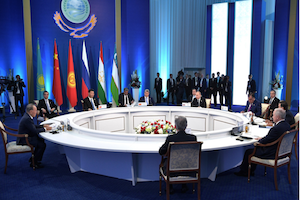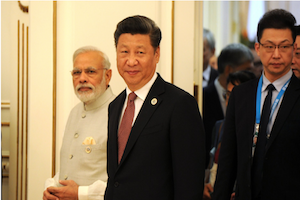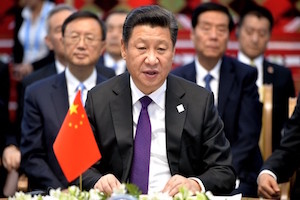Pakistan in the SCO: Challenges and Prospects
By Rizwan Zeb
February 8, 2018, the CACI Analyst
The Shanghai Cooperation Organization’s (SCO) Council of Heads of Government (CHG) held its 16th meeting on November 30-December 1, 2017. Pakistan’s PM Shahid Khaqan Abbasi highlighted the pivotal role that Islamabad can play in achieving the SCO’s objectives by serving as a bridge between Central and South Asia. However, in order to realize the potential benefits of Pakistan’s SCO membership, Islamabad needs to intensify its public diplomacy and improve its standing among the other member states by aligning its policy with other regional powers. Is Islamabad ready to do this?

Iran's Chabahar Port Empowers India-Afghanistan Trade at Pakistan's Expense
By Sudha Ramachandran
January 10, 2018, the CACI Analyst
On November 11, a consignment of 15,000 tons of wheat arrived in Afghanistan from India via Iran’s Chabahar port. This is an important milestone for the three countries as it marks the operationalization of the transit trade agreement they signed in 2017. In addition, the first phase of the development of Chabahar port has been completed. It is expected to energize Iran’s economy and provide India with a gateway for overland access to Afghanistan and the Central Asian states. Importantly, landlocked Afghanistan now has another outlet to the sea, reducing its dependence on Pakistani ports. This will reduce Islamabad’s influence over Afghanistan.

The India-China Clash and the Expanded SCO
By Stephen Blank
October 16, 2017, the CACI Analyst
The recent Indo-Chinese crisis over the Doklam area has been peacefully resolved for now, yet its repercussions risk spilling over to both South and Central Asia and beyond. The Doklam clash has demonstrated to China that it can no longer push India around, and India immediately registered that lesson in self-confidence by stating that it will play a larger role in Southeast Asia, another area where they both jostle for influence. Similarly, we can expect an expanded rivalry in Central Asia, not least within the framework of the Shanghai Cooperation Organization (SCO) now that India and Pakistan are both members.

China's Peacemaking Between Pakistan and Afghanistan
By Sudha Ramachandran
September 7, 2017, the CACI Analyst
With its shuttle diplomacy between Pakistan and Afghanistan to ease tensions between the two neighbors, China has expanded its peacemaking role in the Afghan conflict. Successful peacemaking is vital for ensuring stability in the region, which in turn is needed to secure the future of China’s Belt and Road Initiative. It will require Beijing to move beyond offering Kabul and Islamabad economic incentives to address the core issue underlying Afghanistan-Pakistan estrangement: alleged support to acts of terror directed against each other. Given its own strong interests in undertaking peacemaking, can China be an honest broker?

What Drives Russo-Pakistan Relations and Where Are They Going?
By Stephen Blank
August 29, 2017, the CACI Analyst
Inexplicably, Russia’s rapprochement with Pakistan over the last several years has received little or no attention in the West. It raises several vital questions about Russian policy in Central and South Asia as well as Russia’s approach to terrorism and to India and China. Since Moscow now advertises itself as a partner to the West in a new phase of the war on terrorism, its relationship to Pakistan and thus to the anti-terrorist war in Afghanistan possesses is highly relevant. Yet this relationship remains an unduly neglected issue in the analysis of Russian foreign policy.



